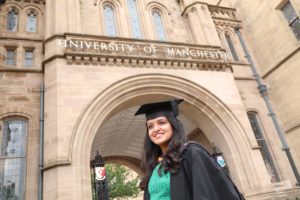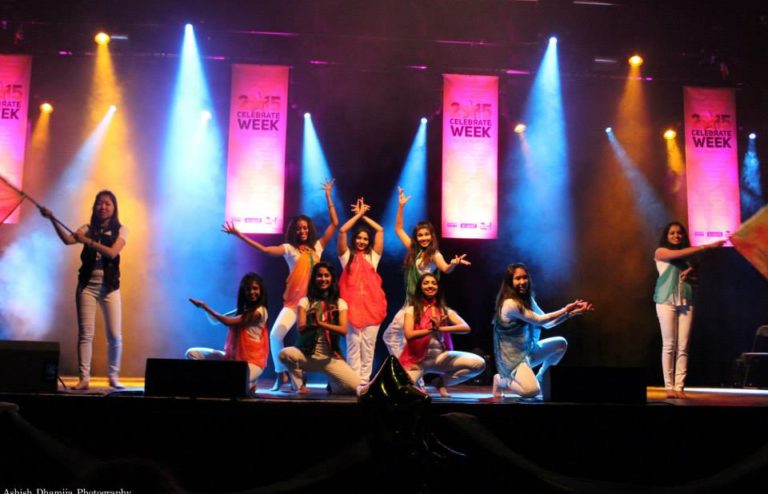Our alumni: transferable skills and an exciting change of career path
Biomaterials Women in engineering 20th July 2023
Hi Aiswarya, thanks so much for talking to us today! Why don’t you give us a quick summary of who you are and what you’re up to at the moment.
Yes sure! So I did an integrated master’s course (MEng) at The University of Manchester from 2014-2018. I studied Biomaterials Science and Tissue Engineering, a course that covered an eclectic mix of subjects related to medicine, engineering, and business.
Straight out of uni, I joined a graduate scheme at the Cambridge headquarters of Arm, a semiconductor designer. I spent two years at the company, towards the end of which I worked as part of the change management team that helped streamline processes across departments. Working in this role made me realise that I enjoyed the variety that comes with consulting and pushed me to switch gears and pivot to strategy consulting. The change in industry also brought with it an exciting move to London and a return to my life sciences roots.
Outside of work, I try to fill my days with travel, good food, and quality time with friends and family. In 2023, one of my personal goals is to find a new fitness class I can stick to (hot yoga is the current frontrunner) and to continue having new experiences, like the Bird & Blend tea blending course I recently signed up for!
Ooh that sounds great! So first of all, can you tell us a bit about your current role and what it involves?
I am currently a Senior Associate Consultant in L.E.K. Consulting’s London office. In this role, I serve a wide spectrum of clients in the life sciences, ranging from big pharma companies and biotechs to private equity and venture capital firms that invest in the sector.
On a day-to-day basis, I lead project teams of 5-10 people to help clients solve challenging problems. My projects typically revolve around forecasting the revenue of new drugs, advising on mergers and acquisitions, creating go-to-market strategies for new products, or devising plans for international expansion. The overarching aim of these projects is to provide clients with impactful and actionable recommendations that will ultimately shape their business strategy.
The main tasks I am responsible for include managing junior team members, overseeing primary and secondary research (such as creating financial models), crafting storylines, and presenting our findings to the client.
How did you find the recruitment process for your current job, especially given that it was a bit of a change of direction?
Once I decided I wanted to explore strategy consulting, I turned to the internet and to friends and Manchester alumni who work in the sector to learn more about the typical recruitment process. These conversations helped me understand the inner workings of the industry and identify methods to make my application stand out- such as quantifying achievements and highlighting problem-solving skills wherever possible.
As with most large consulting firms, L.E.K. has a structured and multi-step recruitment process, which includes numerical reasoning tests and case interviews (typically market sizing and strategy case studies). The process is designed to test your ability to logically think through problems, articulate your thought process, and arrive at a robust final solution.
How did your degree help you to get where you are now?
I can safely say that I would not be able to land my current role if it weren’t for my degree, not least because having an educational background in the life sciences was a job requirement. My degree at Manchester offered the perfect mix of content. I credit the biology modules for helping me understand the science, and the business modules for teaching me about the process of bringing medical innovations to market.
In addition to academics, the four years I spent at Manchester also provided excellent soft skills training. Thanks to various part-time jobs, student societies, and other extracurriculars, I figured out what type of roles and activities interest me the most and learnt to effectively work in teams with people with different backgrounds. My university days also served as a masterclass on time management as I initially struggled and ultimately grew comfortable with juggling competing priorities (such as coursework, extracurriculars, fitness, and part-time jobs) all the while maintaining an active social life and getting 8 hours of sleep each night.
What advice would you give to young people considering a course or career in STEM (Science Technology Engineering & Maths)?
My advice to those considering studying STEM subjects would be to always think of their future careers with open minds. The paths you can pursue with a STEM degree are diverse and evolving and it’s important to stay future-focused to not miss out on new opportunities.
I would urge prospective students to think not only about what they want to study for the next 3-4 years but also about what types of problems they want to tackle for the 30-40 years of their careers. If in doubt, there are plenty of opportunities for exploring various paths. For those struggling to decide on a path, I highly recommend doing internships and speaking to people who currently work in interesting roles.
And to recent grads and those who have just started their careers, I would remind them that we are quite fortunate to live in a time where it’s relatively easy to make a change if we find that our initial choice wasn’t the right one. Some of the people I admire the most have had circuitous career paths. Nobody should have to spend their entire adult lives feeling bound to a decision they made when they were 18.
Absolutely! Thank you so much for that really useful and important advice Aiswarya.
I’m also keen to know about what else you got up to during your time in Manchester outside of studying, as it sounds like you also got involved in quite a few extra-curricular things?
Looking back, my favourite parts of being a student in Manchester were the people I met, my newfound independence, and the endless opportunities to try new things. Some of my very best memories are from catching up with friends at pre-drinks on Friday nights, performing with the Indian Dance Society, running the weekly Refugee Conversation Club, trying my hand at beginner-level Japanese, and going on midnight strolls in search of the best kebabs in town.
I also really enjoyed my part-time jobs. The most interesting jobs I had included working at the Old Trafford football stadium on match days and giving tours of new buildings on campus to alumni as an Events Ambassador for the University. My absolute favourite job was being a Reporter for The Mancunion, the weekly student newspaper, where I got paid to eat at new restaurants and write honest food reviews.
Wow! It sounds like you took up lots of opportunities to make the most of your time here. Manchester is a great place to live and study and work- what do you think was your favourite thing about the city?
Like most students here, I fell in love with Manchester and came to think of it as home. To this day, I don’t know of another city that has as many hipster cafes, unbeatable student discounts, and genuinely friendly people. There was something special about walking down Oxford Road and bumping into people I knew, especially on the summer days when the sun was shining, and the street was streaming with students sunbathing on lawns and scrambling to get to class.
As Lemn Sissay says in his poem Belong, there’s something in the air of Manchester that makes you feel like you belong there. That feeling is hard to pin down and nearly impossible to replicate and I’m very grateful I got to experience it.




Leave a Reply
You must be logged in to post a comment.